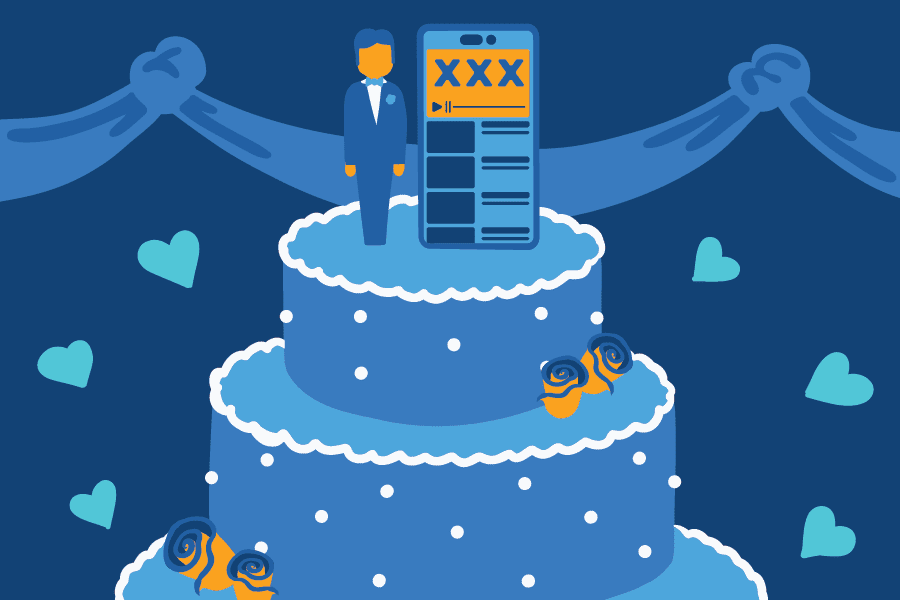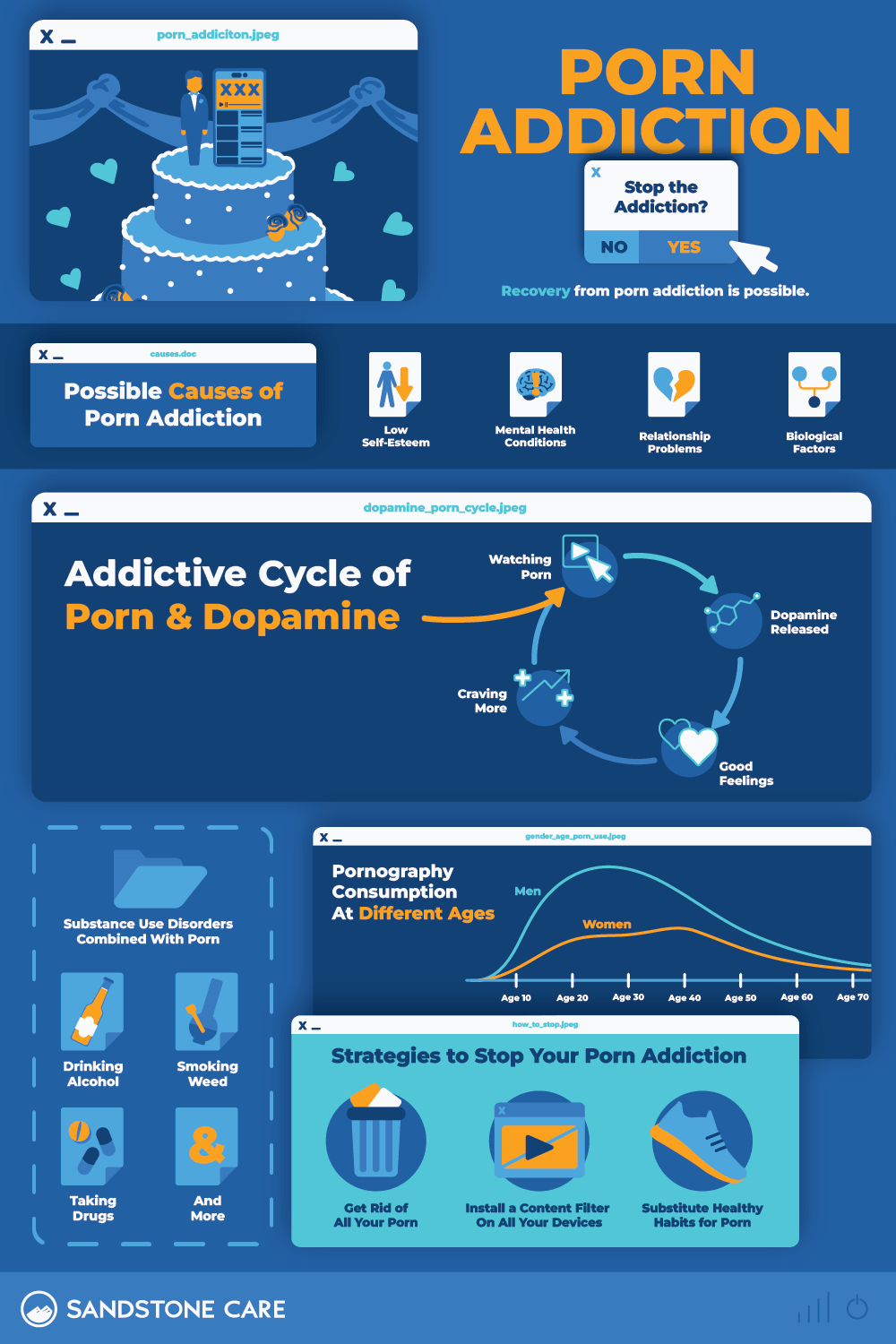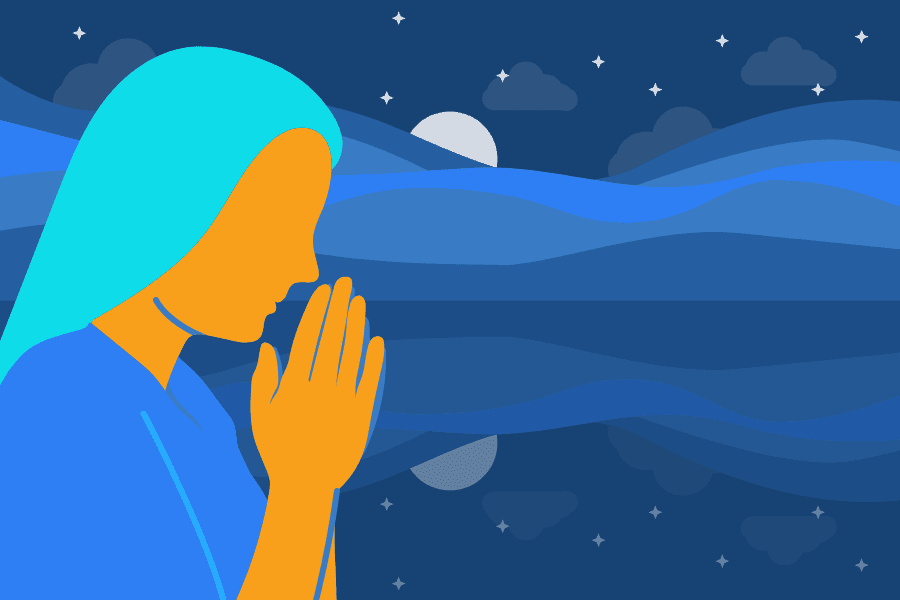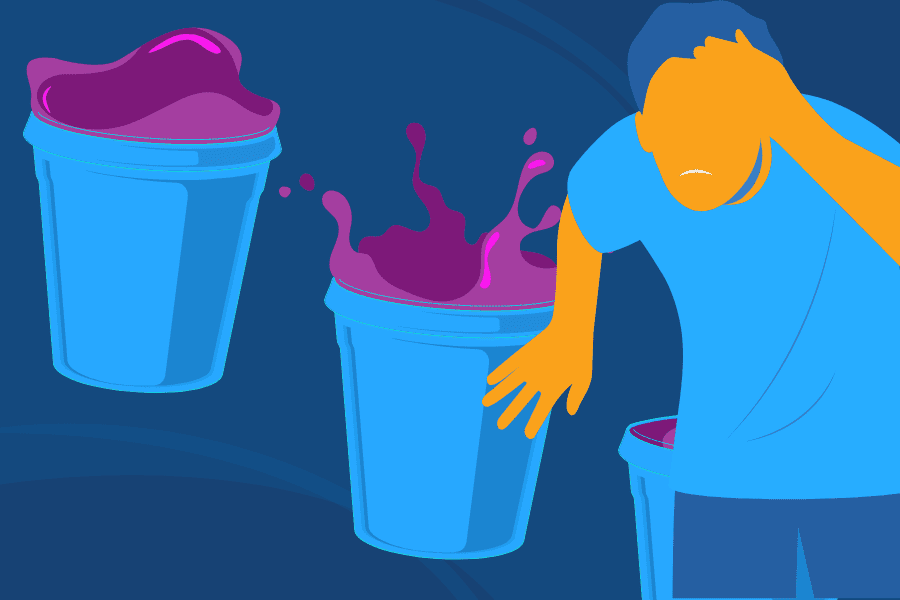Pornography Addiction
What Is Pornography Addiction?
Pornography addiction happens when someone feels that they can’t stop watching porn, even when it hurts their relationships, mental health, or daily life.
It’s normal to be curious about sex, but watching pornographic material regularly can quickly lead to a self-destructive drive to watch more often, and to watch more extreme content.
Watching porn triggers the release of dopamine, the brain’s “feel-good” chemical. Dopamine is the same chemical released in many other addictions, like drug abuse and gambling addiction.
Over time, the brain builds up a tolerance to this new, higher level of dopamine. This means the same content no longer gives the same level of satisfaction. To feel that high again, people start seeking more intense, niche, or taboo content.
People often start with simple, soft-core porn, but over time, they might find themselves looking for more graphic or even violent material to feel satisfied.
For example, they might begin with regular, romantic sex scenes but then seek out more explicit acts or unusual fantasies just to get the same excitement.
This rewires the brain, making real-life intimacy feel less fulfilling. In relationships, this can cause problems, as people may struggle to feel aroused during sex with their partner or become emotionally distant from them.
Before the internet, there were natural barriers to finding sexual entertainment. People had to buy magazines or rent tapes, which took effort and money.
Now, unlimited free content is just a click away, making it easier than ever to fall into dangerous habits. Studies show that about 11% of men and 3% of women in the U.S. believe they’re addicted to porn.
Most people have their first experiences with porn before they even become teenagers, during a critical stage of brain development.
Many use porn to escape stress, loneliness, or boredom, but over time, porn addiction can make these exact same symptoms even worse as users isolate themselves from their real-life relationships.
Some groups are more vulnerable, including men, religious individuals (who may experience more guilt and shame around sexual desires), and people with past trauma.
Porn addiction leads to real consequences—relationships become strained, real-life intimacy becomes hard to find, and shame and isolation start to take over. Even when those who suffer from porn addiction recognize that it is making their life worse, it is difficult to break away from it.
The instant access, the embarrassment, and the lie that “it is okay because everyone does it” can keep people trapped in the cycle of porn addiction for years longer than they want it to.
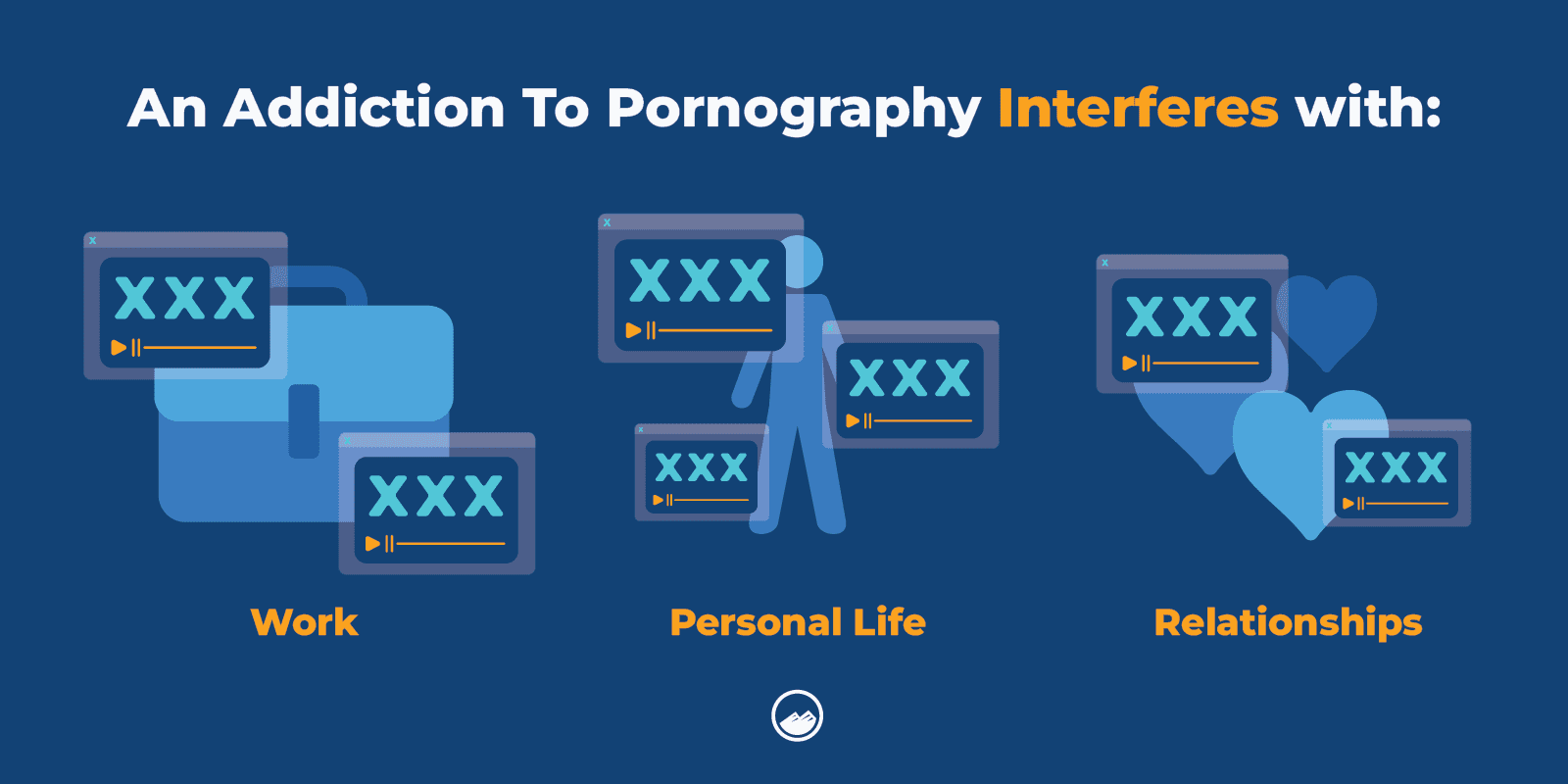
Is Porn Addiction Real?
Yes, porn addiction is a real form of behavioral addiction, similar to gambling or drug addiction.
Some people claim that watching porn is always “normal” and “harmless,” especially among men. However, many people who suffer from porn addiction can’t break away from the need to watch sexual content, even when they see the harms it is causing.
For example, a man might stay up late, watching porn long after his partner falls asleep. At first, it was something he could control, and it just helped to take the edge off of a stressful day.
Soon he finds he can’t fall asleep without watching porn for longer and longer. His partner starts to feel heartbroken by his shift in behavior, he seems distant, and he has stopped coming to bed. He tells himself he’s just trying to relax, but he knows that he is losing her, and he can’t figure out how to stop.
Others may begin to hate looking at themselves in the mirror, struggle to stay on top of their responsibilities at work, or lose interest in things they used to love to do.
None of these experiences are harmless, and they should not be considered normal.
Porn addiction is real, and it can cause the same devastating effects on individuals and families as any other addiction.
Why Is Porn So Addictive?
Porn is so addictive because it hijacks the brain’s reward system, creating a powerful cycle of pleasure and shame that’s hard to escape.
Sexual content has a uniquely powerful effect on the brain because it taps into our deepest evolutionary drives. The brain associates sexual pleasure with survival, making it one of the most rewarding experiences in the human brain.
When a person watches porn, their brain releases a rush of dopamine, the “feel-good” chemical that makes them feel pleasure and satisfaction.
At first, the higher dopamine might sound like a good thing. More dopamine seems like it should make you feel better, right? But the truth is, it actually lowers your baseline ability to feel happy on your own.
The brain is designed to stay balanced, so after a big spike in dopamine from watching porn, the brain actually lowers the natural dopamine levels and makes the receptors less sensitive to it in an effort to keep things balanced.
Over time, the brain adjusts to this higher level of dopamine, and normal, everyday activities no longer bring the same pleasure. This means when you try to stop watching porn, the brain reacts by crashing down into feeling drained, empty, and depressed.
What makes porn addiction especially dangerous is the secrecy that often surrounds it. People are usually ashamed of their habits, and the need to hide it adds an extra layer of excitement and pleasure.
The thrill of doing something forbidden boosts dopamine even more, driving the cycle of addiction even further.
It also makes it more difficult to ask for help since the topic can feel embarrassing and shameful.
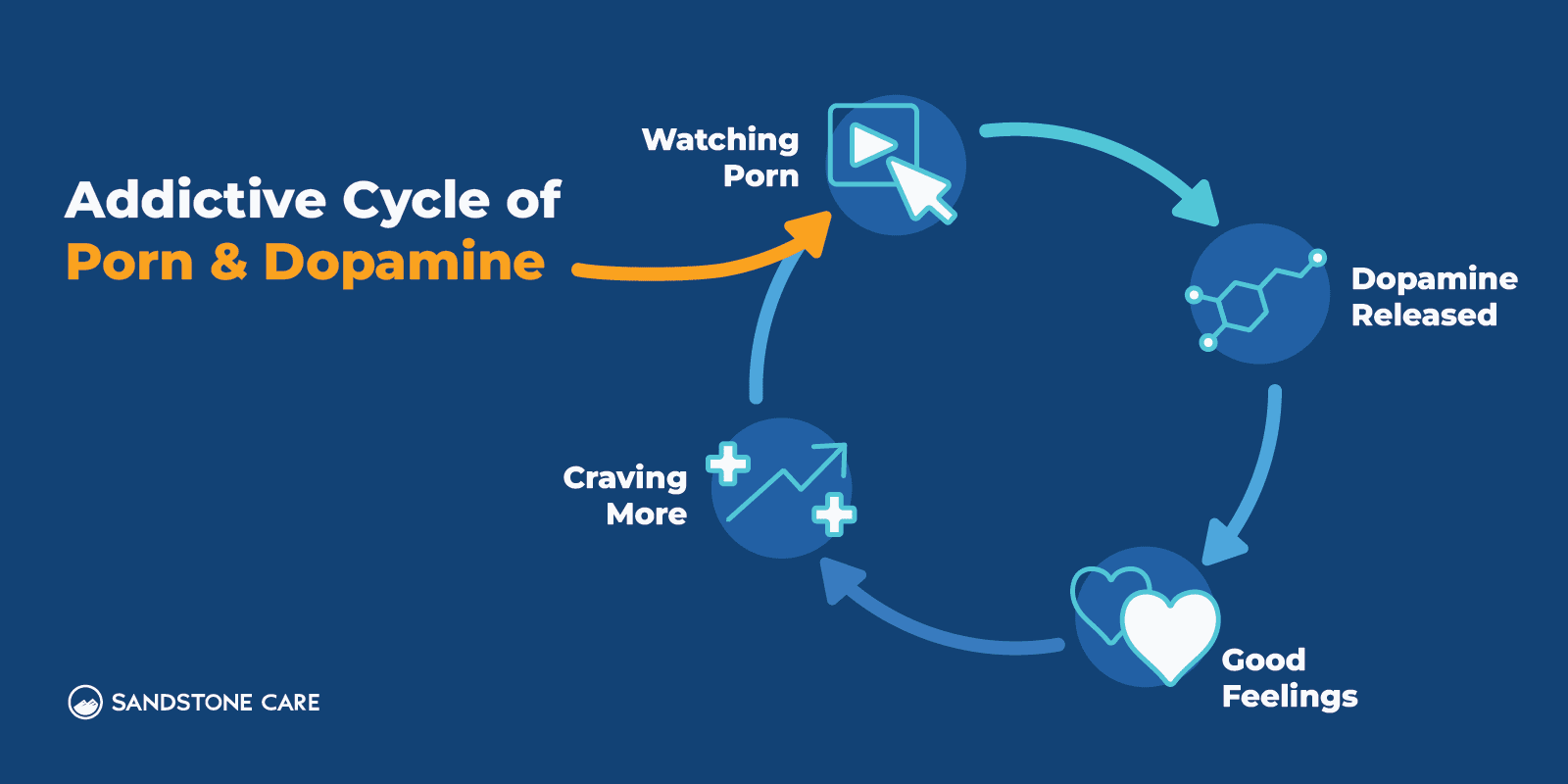
What Is Considered Porn Addiction?
A person can be considered addicted to porn when they can’t stop watching it, even if they want to, and when it interferes with their relationships, daily life, and health.
When someone’s porn use starts to damage their life and relationships, it’s a clear sign that casual use has crossed into addiction. Casual viewing is occasional and doesn’t usually affect other areas of life, but when it becomes a regular habit that’s hard to control, it becomes a problem.
For example, if a person starts watching porn multiple times a day, it’s no longer just for an occasional escape. Instead of focusing on work or spending time with family, they’re prioritizing porn, which shows they’re becoming dependent on it.
Neglecting responsibilities is another red flag. If someone is missing deadlines, avoiding work calls, or putting off important tasks just to watch porn, it means they’re letting it take control of their life.
Even if they want to stop, the urge to watch can be too strong, which is a sign of addiction.
In relationships, the shift is obvious. If someone starts avoiding physical intimacy with their partner or feels disconnected during sex, it shows they can’t enjoy real-life intimacy the way they once did.
They might even prefer being alone with porn instead of spending quality time with their partner. Despite feeling guilty or ashamed, they find it hard to stop, which further deepens the cycle of addiction.
How Common Is Porn Addiction?
According to Neuropsychopharmacology, pornography consumption is prevalent, specifically for young adult males.
One study done in 2019 suggests that the prevalence of hypersexual disorders, which porn addiction may qualify as may range from 3% to 6%.
However, these numbers can be hard to pinpoint. This is because porn addiction is often hidden due to shame or embarrassment, and many people may not recognize their behavior as problematic until it has already caused significant damage to their life.
Additionally, there are varying opinions among experts about what qualifies as an addiction and how to diagnose it, making it challenging to gather exact data.
What Percentage of Men Are Addicted to Porn?
It’s hard to know exactly how many men are addicted to porn, but estimates suggest that about 5-8% of men may struggle with compulsive porn use.
The actual number could be higher, as many people feel too ashamed or embarrassed to admit they have a problem, leading to underreporting.
It’s important to note that not everyone who views porn is an addict.
Many people can watch it occasionally without it causing problems to their lives or relationships.
However, for men who struggle with porn addiction, they can feel a loss of control in their family life, careers, and romantic relationships.
Men in the United States are also more likely to avoid asking for help, whether from loved ones or professionals, because of the stigma around addressing mental health and addiction issues.
Many men believe their porn use is normal, even when it starts causing problems in their life, which makes them less likely to recognize it as an addiction. They may feel they should handle the issue on their own or worry that seeking help makes them seem weak.
Because of the private and sensitive nature of porn use, it’s challenging to get a complete picture of how widespread addiction porn addiction truly is.
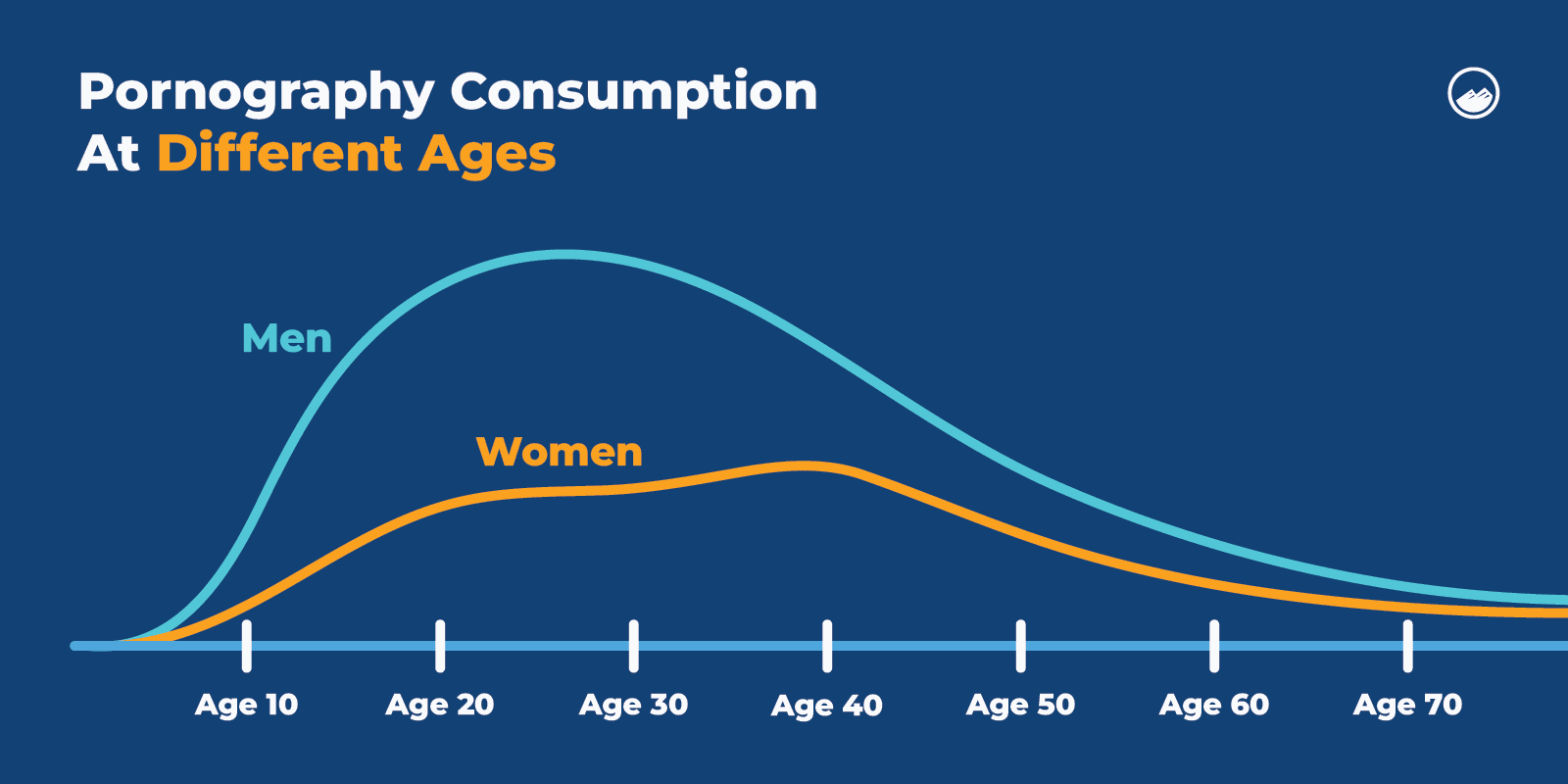
Causes of Porn Addiction
What Causes Porn Addiction?
Some of the possible causes of porn addiction can include:
-
Low self-esteem
-
Underlying mental health conditions such as anxiety or depression
-
Relationship problems
-
Biological factors, such as brain chemistry and dopamine release
-
Childhood trauma or abuse
-
Lack of emotional fulfillment or intimacy in personal relationships
-
Easy access to porn through the internet and mobile devices
-
Social isolation or loneliness
-
Coping mechanism for stress or emotional pain
-
Religious beliefs or growing up in a high-shame culture that creates guilt around sexuality
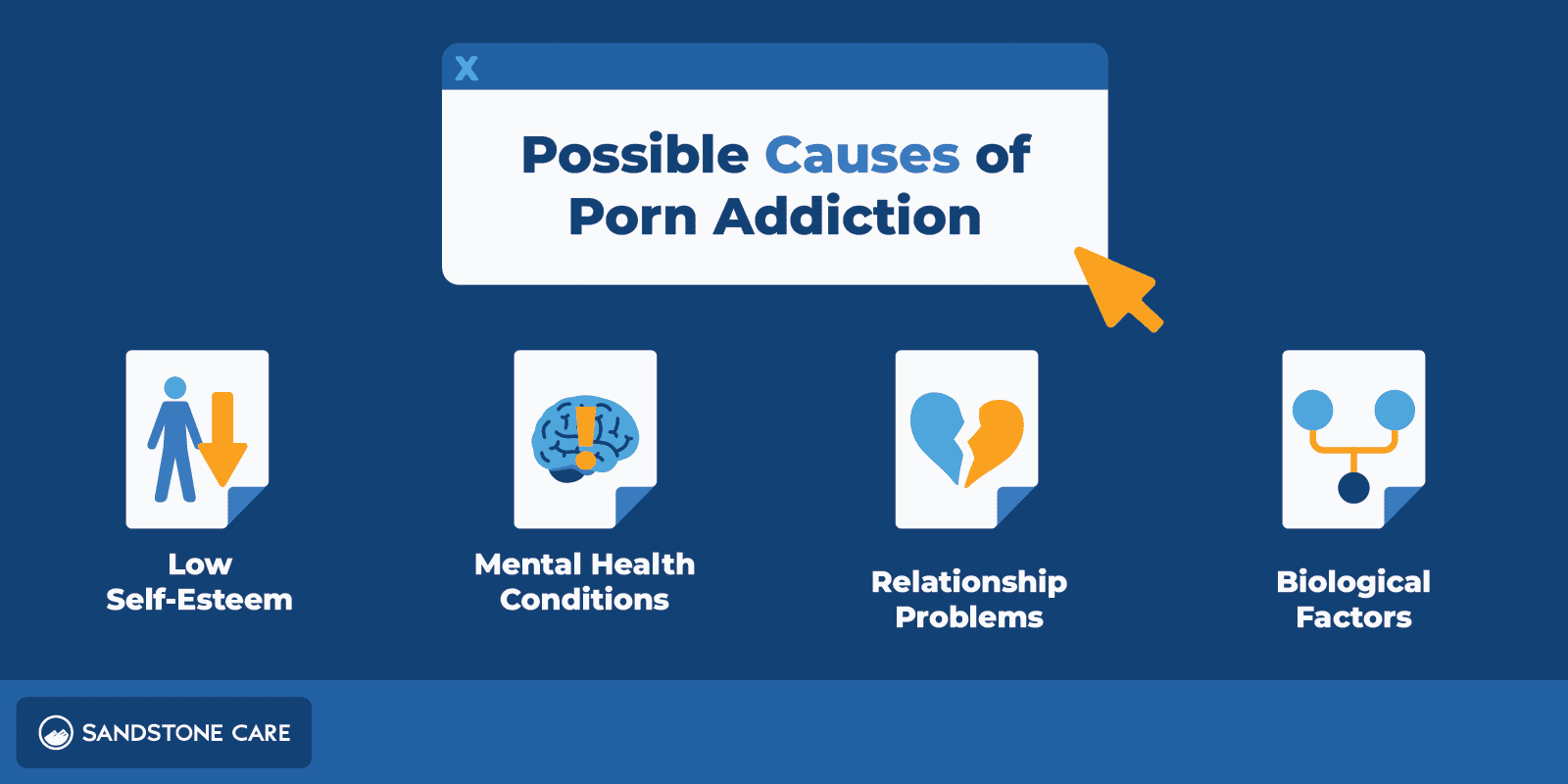
How Does Watching Porn Turn Into a Porn Addiction?
Since porn triggers a powerful release of dopamine, the brain adapts by reducing its sensitivity to it. This means that to feel the same level of excitement, a person needs to watch more often or for longer periods.
As this cycle continues, porn becomes less about enjoyment and more about satisfying an urge.
Over time, as a person continues to watch porn, the brain starts associating this action with pleasurable feelings. This association can then create the urge and make a person feel the need to watch it over and over again, even if they want to stop.
Some experts say that compulsive porn use can affect brain activity in a similar way to those who face challenges with drug or alcohol addiction.
What Are Examples of Mental Health Conditions That Co-occur With Porn Addiction?
Some of the more common mental health conditions that can co-occur with porn addiction can include:
- Anxiety disorders
- Depression
- Mood disorders such as bipolar disorder
- Personality disorders
- Post-traumatic stress disorder (PTSD)
- Obsessive-compulsive disorder (OCD)
- Attention Deficit Hyperactivity Disorder (ADHD)
Porn addiction can also co-occur with substance use disorders as well.
A person may also use porn as a way to cope with the stress of symptoms of mental health or substance use disorders.
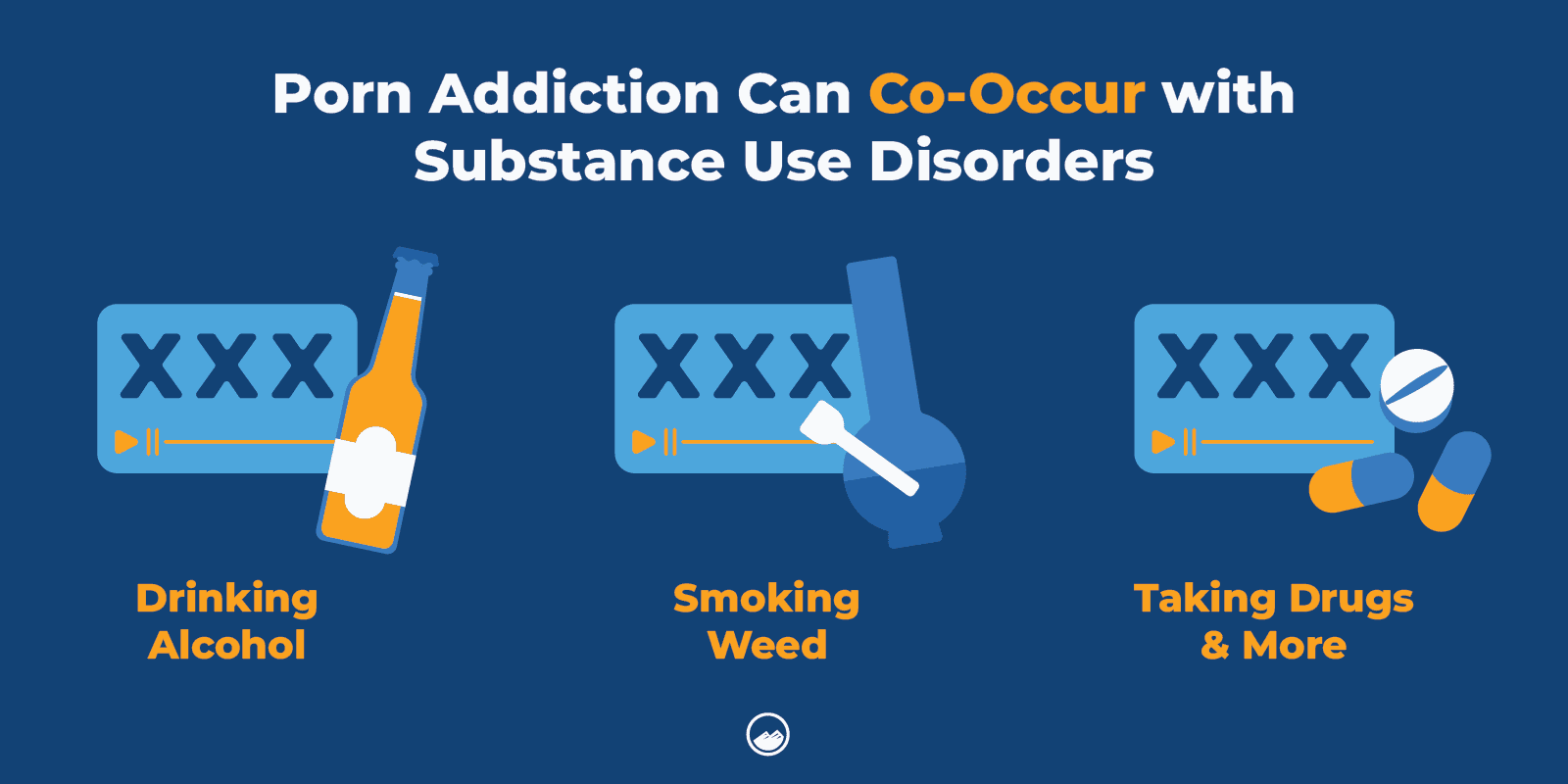
What Is the Root Cause of Porn Addiction?
The root cause of porn addiction is a cycle of dopamine-driven brain changes combined with underlying emotional struggles from stress, trauma, loneliness, low self-esteem, relationship problems, or cultural shame around sexuality.
If an individual is looking for help with porn addiction, identifying and addressing the underlying problem can help change the behaviors and actions they take as a result of them.
For some, the root cause of porn addiction may be an underlying mental health condition. For others, it could be trauma, unhealthy relationships, or a biological factor.
Does Trauma Cause Porn Addiction?
Unresolved trauma can put a person at a higher risk of developing an addiction, including porn addiction.
Trauma can also include exposure to pornography at a young age, which may cause a pornography addiction in the future. Other forms of trauma, such as abuse or childhood maltreatment, may also contribute to the development of a porn addiction.
Many people who struggle with porn addiction report using it as a way to cope with difficult emotions, loneliness, or feelings of unworthiness that can often follow traumatic experiences.
Over time, this coping mechanism can turn into a compulsive habit, as the brain associates porn with relief from emotional pain. Because trauma is often deeply buried and difficult to address, people may not even realize that their addiction is connected to past trauma.
Who Is at Risk for a Porn Addiction?
Individuals with low self-esteem, underlying mental health conditions, or a history of trauma can be at a higher risk for porn addiction.
Find the Help You Need Today
Porn Addiction Signs
Am I Addicted to Porn?
If you’re wondering whether you’re addicted to porn, ask yourself these key questions: Do you feel unable to stop watching it, even when you want to? Does it interfere with your daily life, relationships, or responsibilities? If so, you may be addicted to porn.
Another potential sign of addiction is when you need to watch more and more extreme content to feel the same level of satisfaction, or if watching porn leads to feelings of shame, guilt, or frustration.
It may also be affecting your relationships, such as creating emotional distance or sexual dissatisfaction with a partner. If any of these scenarios feel familiar, it might indicate that porn use has crossed the line from a habit into an addiction.
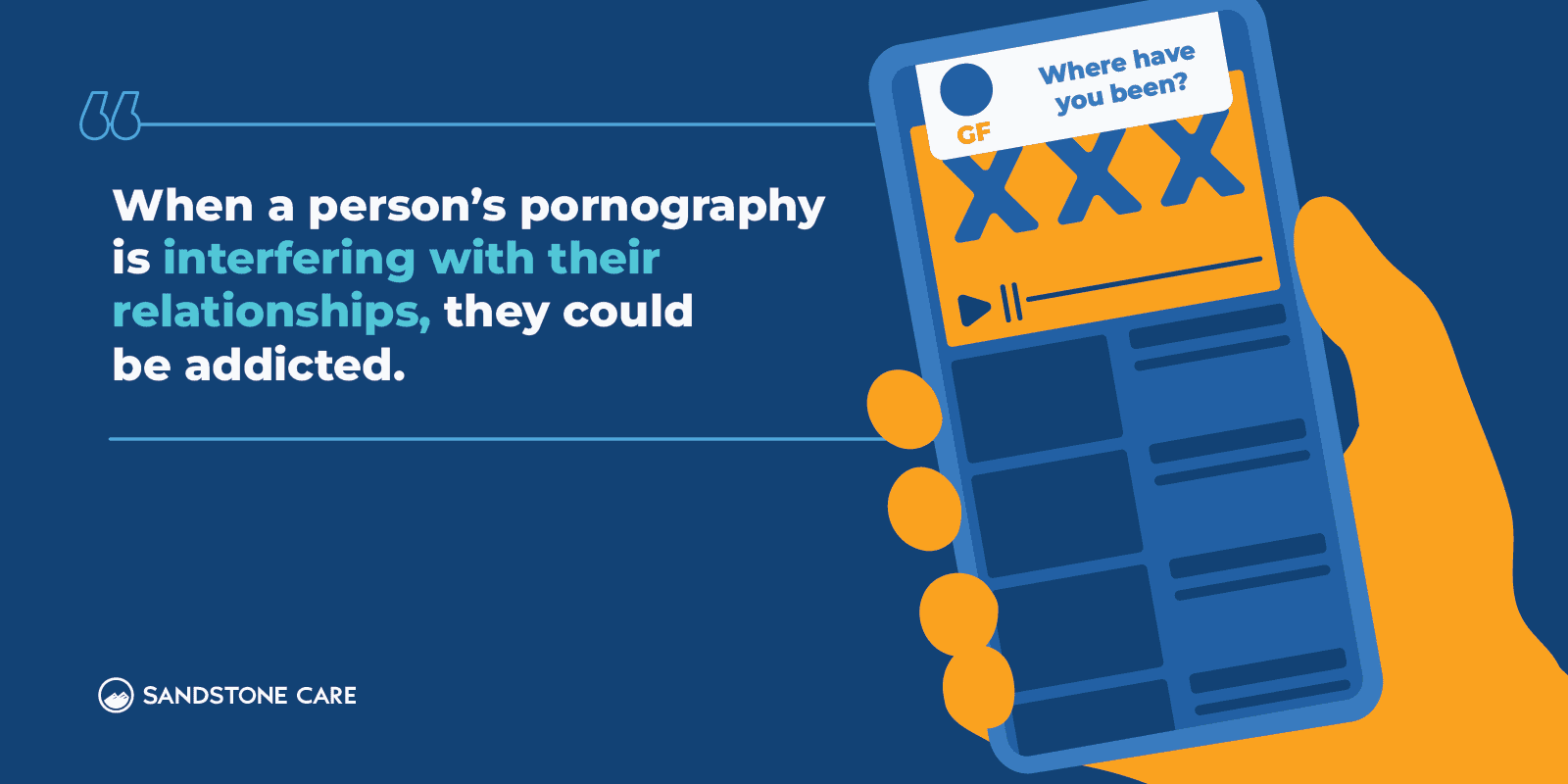
What Does Porn Addiction Look Like?
Some common signs of a porn addiction include:
- Ignoring daily responsibilities to watch pornography
- Feeling ashamed after watching porn but continuing porn use
- Sex life becomes less satisfying
- Porn use causes problems in their relationship and intimacy
- Starting to view more extreme pornography (such as roofie attack or drug related porn)
- Spending a significant amount of money on pornography
- Using pornography as a coping mechanism for sadness, anxiety, or other difficult feelings or mental health issues
For loved ones, porn addiction can show up as changes in communication, trust, and closeness.
You might notice your partner or friend spending more time alone or on their devices, avoiding important conversations or shared activities.
They may become secretive or defensive about their internet use, causing tension and distance in the relationship.
You could also feel hurt or confused, especially if the addiction affects your emotional or physical connection. Their mood might change suddenly when they can’t access porn.

Is this blog hitting close to home?
We’re here to help.
How Do You Know If You Have a Porn Addiction?
Not everyone who watches porn has an addiction, but you can know if you have a porn addiction if you are unable to focus on anything else, neglect daily responsibilities, and need more frequent or extreme content to feel turned on.
Being sneaky about your use—hiding it from your partner or lying about the time you spend watching—can also be a red flag.
You might notice you’re consistently late to important events, losing sleep, or struggling to keep up with daily responsibilities because you can’t stop watching.
If you feel unable to relax or unwind without using porn, then it has likely transformed into an unhealthy way to cope with stress.
You may also feel deeply ashamed, paranoid, or guilty, especially if you have begun lying about watching or listening to porn.
This can throw you into a cycle of feeling stressed, calming yourself by watching porn, and then feeling more stressed because you hate yourself for turning to porn use.
Shame cycles around porn use are very common among those who have religious trauma or feel morally against porn, but still can’t seem to stop themselves from viewing it.
If you suspect you or a loved one may have a porn addiction and are unsure what to do, it is best to reach out to a professional such as your healthcare provider or a mental health professional, to get support.
Therapists can teach you practical ways to cope and set realistic goals for change.
They might use different methods like talking therapy or mindfulness to help you get back in control.
Therapy also will help you in rebuilding relationships and improving communication, which is essential for recovery.

Are you addicted to the internet? Find out Now
Porn Addiction can be a small piece of an overall addiction to the internet. Take our quiz to see if you are struggling with something more.
Porn Addiction Symptoms
What Are the Symptoms of Porn Addiction?
Symptoms of porn addiction can include:
-
Being unable to stop even when trying
-
Constantly thinking about porn
-
Needing longer or more explicit material to feel satisfied
-
Feeling irritable or restless when not watching
-
Neglecting responsibilities at work, school, or home
-
Losing interest in real-life intimacy or relationships
-
Feeling persistent guilt or shame without being able to stop
-
Hiding or lying about porn use
-
Using porn to escape stress, loneliness, or pain
-
Spending excessive amounts of time or money on it
-
Experiencing fatigue or poor sleep from binge-watching
-
Withdrawing socially or losing interest in hobbies
-
Feeling increased anxiety or depression related to self-esteem issues
Some symptoms of porn addiction are visible to the people around them.
For example, someone might frequently excuse themselves to be alone, saying things like, “I just need some time to unwind,” but instead, they use this time to watch pornography over and over again.
Their day might revolve around planning their next viewing, causing them to decline social invitations or family events when they’re actually prioritizing their addiction.
As the addiction progresses, they might find themselves searching for more extreme or different types of content because the usual material no longer satisfies them.
When attempting to cut back or quit, they could snap at loved ones who are trying to interact with them.
This pattern can lead to significant neglect of responsibilities. They might miss deadlines or skip meetings, and when questioned, they might defensively respond, “I’ve got it covered, don’t worry,” even though they’re falling behind.
Relationship strains become apparent as they might avoid intimacy or react defensively to concerns about their behavior.
Despite facing negative consequences like job insecurity or relationship troubles, they might continue to dismiss the seriousness of their situation with thoughts like, “I can stop anytime I want—I just don’t want to right now.”
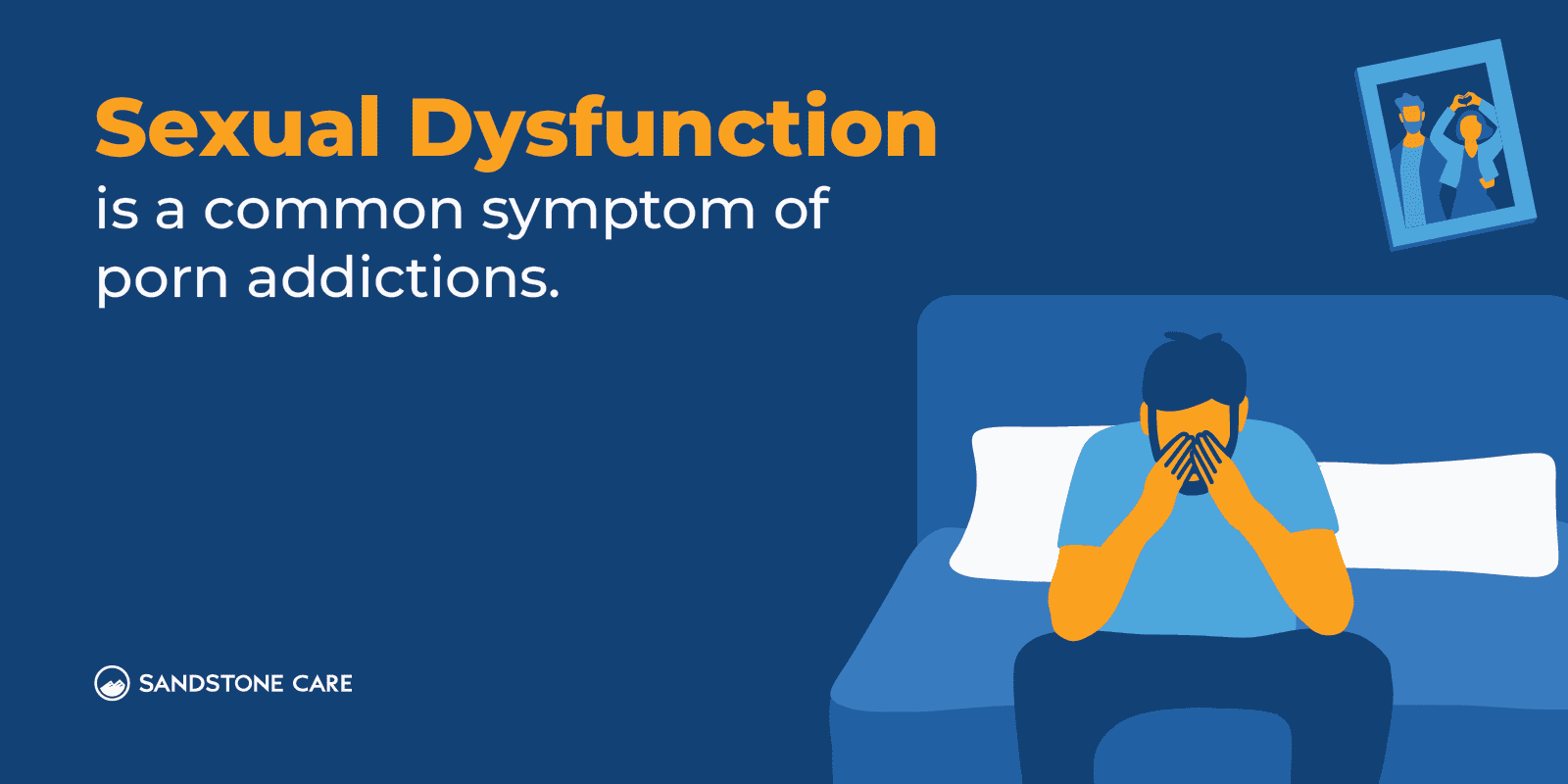
What Can Porn Addiction Cause?
Porn addiction can cause:
- Relationship Problems:You might hide your porn use from your partner, leading to trust issues. Emotional distance, arguments or even breakups may happen if your partner feels hurt, neglected, or that they can’t live up to the extreme standards in the porn industry.
- Self-Esteem and Self-ImageYou may feel guilty or ashamed because you can’t control your porn use. Your self-esteem could suffer as you compare yourself to unrealistic body standards in porn.
- Mental Health IssuesWatching porn might be your way of coping with stress, but it could make anxiety or depression worse. You may start feeling isolated or depressed because of your addiction.
- Physical Health and Sexual Dysfunction:You could develop erectile dysfunction, finding it harder to get aroused with a real-life partner. Your interest in sex with your partner may decrease because you rely on porn for arousal.
- Daily Life and ResponsibilitiesYou might skip or neglect work, school, or family responsibilities to watch porn. Your productivity and focus can drop as you spend more time on porn. You might lose sleep or feel stressed from trying to hide your behavior.
Can Porn Addiction Cause Anxiety?
Studies show a significant relationship between mental health and pornography use.
Individuals with a porn addiction may experience feelings of shame, guilt, frustration, or sadness that can contribute to mental health disorders like anxiety and depression.
Additionally, pornography use and addiction may cause imbalances or changes in the brain that can lead to the development of anxiety or other mental health conditions.
Does Porn Addiction Cause Depression?
Some people may use pornography as a way to cope with the symptoms of depression, which only ends up worsening the case over time.
There’s a strong link between porn addiction and depression. When someone watches porn compulsively, their brain gets used to an intense burst of pleasure that makes everyday activities seem less enjoyable.
This change in the brain’s reward system can lower self-esteem and leave a person feeling empty or isolated. These feelings—guilt, loneliness, and shame—often pile up, which can lead to or worsen depression.
On the flip side, some people who are already feeling depressed might turn to porn as a way to escape their pain, only to find that it deepens their negative emotions.
It’s a cycle: the more reliant someone becomes on that quick fix, the harder it is to find happiness in daily life, which can further fuel depressive feelings.
While porn addiction might not directly cause depression in every case, it can definitely make someone more vulnerable to it or make existing depression worse.
Can Porn Addiction Cause Microcytic Anemia?
No, porn addiction does not cause microcytic anemia. Porn addiction, while it can impact mental health, relationships, and daily functioning, does not have a direct effect on red blood cell size or iron levels.
Microcytic anemia is a condition where the red blood cells are smaller than normal, typically caused by iron deficiency, chronic diseases, or certain genetic conditions like thalassemia.
Anemia, especially microcytic anemia, can cause fatigue and low energy, making it harder to feel sexually aroused or engaged with a partner. In some cases, individuals may turn to porn for quick stimulation to help with arousal when feeling too exhausted.
Can Pornography Make Trauma Victims Worse?
Yes, pornography can sometimes make trauma victims worse, especially if their trauma is related to sexual abuse or other forms of exploitation.
Watching porn may trigger flashbacks, anxiety, or emotional distress, reinforcing feelings of shame or guilt.
For some trauma survivors, pornography might also become a coping mechanism, which can lead to further emotional harm by avoiding addressing the root causes of their trauma.
This can result in a cycle where porn use worsens their mental health, delaying healing and recovery.
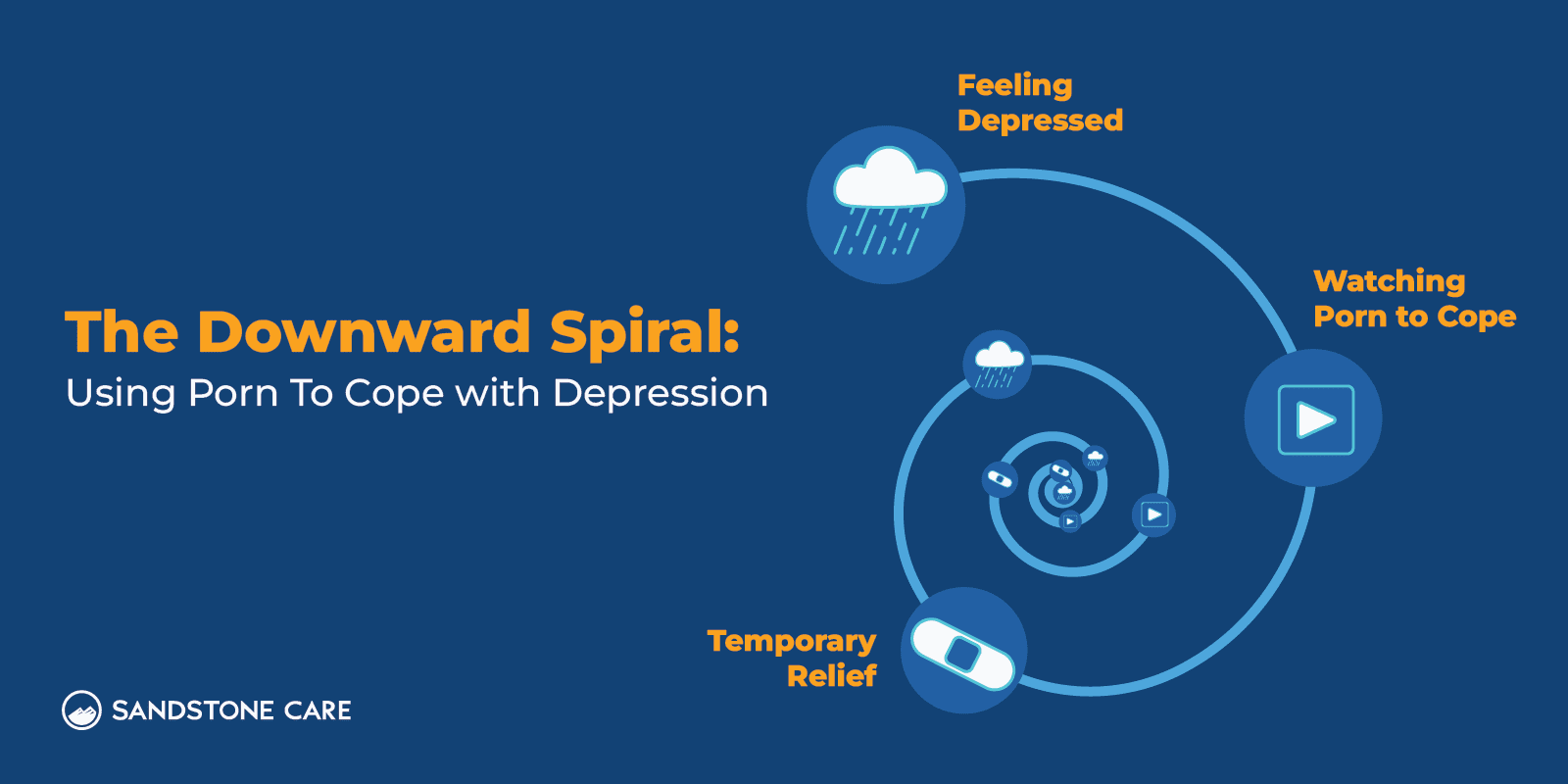
Does Porn Addiction Cause Erectile Dysfunction?
It depends. Some experts think porn can help with erectile dysfunction (ED) by reducing anxiety and increasing arousal. But others warn that too much porn, especially more extreme or niche content, can make ED worse.
This happens because the brain may become conditioned to only respond to very specific types of stimulation, making it harder to get aroused with a real-life partner.
If your porn use involves lying or causes feelings of guilt, it can damage your relationship, adding stress and making ED even more likely.
Also, certain types of porn that objectify or demean people can make guilty feelings worse. When porn conflicts with your values or causes emotional discomfort, it may create mental barriers that make intimacy and arousal with a partner more difficult.
If someone finds they need increasingly niche content to feel turned on, or if they struggle with arousal during intimacy, their porn use could be a contributing factor.
Speaking with a healthcare professional can help determine if porn is linked to ED and offer ways to manage it.
What Are the Impacts of Pornography Addiction?
Porn addiction can take a toll on a person’s physical and mental health, affect their life at work, impact their finances, impact the way they see themselves, and cause problems in relationships.
Individuals with a pornography addiction may experience intimacy issues as their porn use cause feelings of loneliness or unrealistic expectations. It can also make it hard to build healthy relationships for this reason.
Individuals with a porn addiction may also break the trust between them and their partners. Their partners may leave them or have a hard time building back trust in the relationship.
For a person’s physical health, porn addiction can lead to problems like sexual dysfunctions or sleep disturbances that can impact their everyday life and other responsibilities.
Can You Die From Porn Addiction?
No, porn addiction by itself doesn’t directly cause death.
However, the problems that come with it can seriously affect your life. For example, it can lead to severe mental health issues like depression or anxiety, which might cause some people to turn to harmful behaviors, like substance abuse or self-harm.
If someone is struggling with both porn addiction and these other issues, it can become dangerous.
How to Stop Porn Addiction
How Do You Stop Porn Addiction?
Stopping porn addiction requires recognizing the problem, setting boundaries like blocking access to triggers, seeking therapy or support groups, replacing porn with healthier activities, and staying accountable through regular check-ins with a therapist, support group, or accountability partner.
Recognizing and acknowledging that there is a problem is a great first step in overcoming it.
It can be helpful to write down or simply understand why you should and want to give it up and then consider a plan that works for you.
Reaching out for professional help is essential in helping a person address what is truly going on that may be contributing to the porn addiction.
Certain things like cognitive behavioral therapy (CBT) or joining support groups can help a person work through their underlying challenges and build a support system to help them heal and build new habits and lifestyles.
One thing a person can do is get rid of all the pornography they have. People can also install filters on their computers, phones, or tablets, blocking pornographic content.
Additionally, practicing healthy habits in place of porn use can help a person build an everyday life that is free of the urge to turn to pornography as a way to cope or “escape.”
Considering different treatment options and developing a treatment plan with a professional can help you find what works for you on your path to recovery.
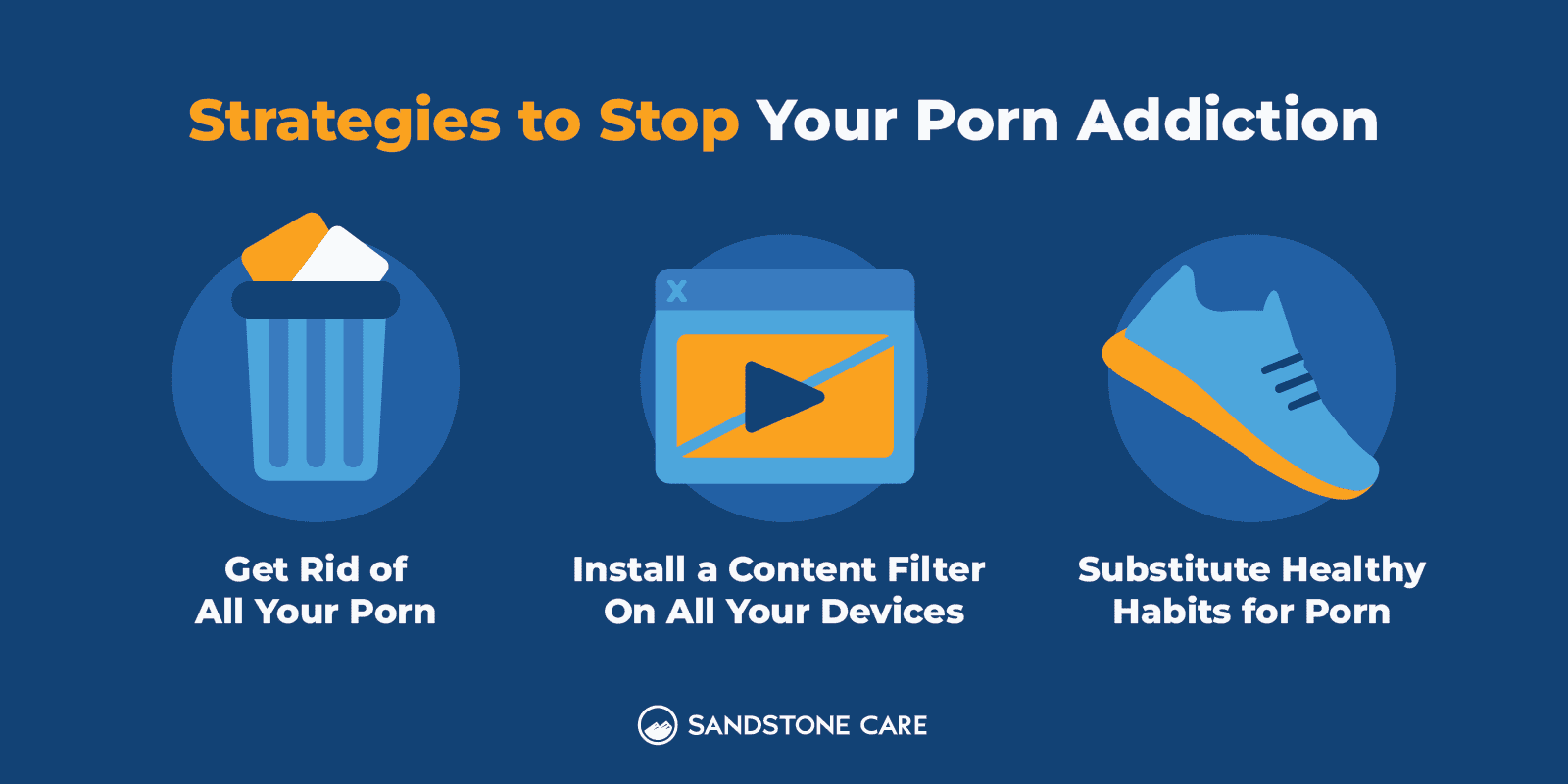
How to Avoid Porn Addiction?
To avoid porn addiction, it’s important to set clear boundaries around your use and stay mindful of how it affects you.
Be aware of how often you’re watching and whether you’re using it to cope with stress, boredom, or loneliness.
If you notice these patterns, it might be time to reassess your habits and focus on healthier ways to manage emotions, such as engaging in activities that bring fulfillment like exercise, hobbies, or spending time with others.
Building a balanced lifestyle that includes meaningful connections and rewarding activities can help prevent porn use from becoming a dependency.
Why Is Porn Addiction Bad?
Porn addiction can impact every aspect of a person’s life. Over time, it can cause serious problems in a person’s health, well-being, and relationships.
Porn addiction can affect many areas of life, causing problems in your health, relationships, and daily routine. It can lead to feelings of shame, stress, and isolation, and make it harder to focus on responsibilities or connect with others.
While porn addiction is bad, having a porn addiction doesn’t make you a bad person.
It’s a struggle many people deal with, and reaching out for help is an important step toward breaking the cycle and improving your life.
Can You Recover From Porn Addiction?
Yes. Recovery from porn addiction is completely possible.
Yes, recovery from porn addiction is possible, but it takes time, effort, and support. It starts with recognizing the problem and being willing to face it, which can be tough but is a huge first step.
Professional help, like therapy, can make a big difference, along with practical changes like setting boundaries and finding healthier ways to deal with stress or emotions.
Support groups and accountability partners can also help keep you on track.
By reading this guide, you’re already making progress—understanding the issue is a powerful way to start. Recovery isn’t about being perfect, it’s about taking small steps to break the cycle and build a healthier relationship with yourself and others.
It’s possible, and many have done it.
How to Quit Porn Addiction?
To quit porn addiction, you can:
- Acknowledge the Problem
The first step is recognizing that porn use has become an issue and is negatively affecting your life. - Set Clear Goals
Decide on specific, realistic goals for reducing or quitting porn. This could involve gradually cutting back or setting limits on when and where you access it. - Find Healthy Alternatives
Engage in activities that bring you joy or relieve stress, such as exercise, hobbies, or spending time with friends and family, to replace the urge to watch porn. - Identify Triggers
Understand the situations, emotions, or thoughts that drive you to watch porn. Knowing your triggers can help you avoid or manage them. - Seek Support
Talk to a therapist or counselor who specializes in addiction. Group therapy or support groups like Sex Addicts Anonymous (SAA) can also provide accountability and guidance. - Use Technology to Help
Consider using apps or software that block access to pornographic sites, helping to reduce temptation.
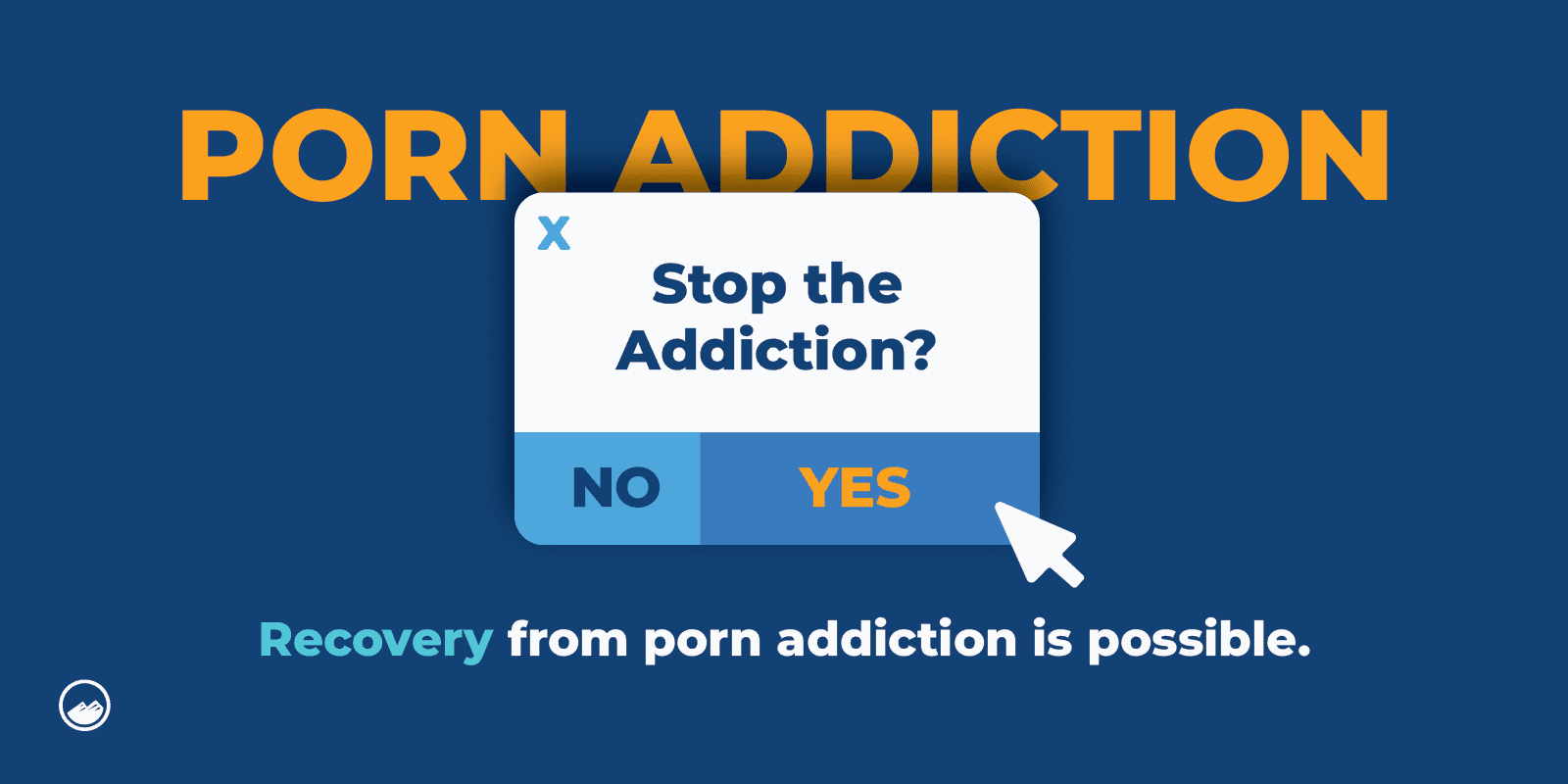
How Long Does It Take to Recover From Porn Addiction?
Recovery from porn addiction is unique to each person.
Some may need weeks; others may take months or years to fully recover from porn addiction.
What Are Porn Addiction Withdrawal Symptoms?
Withdrawal symptoms may occur when a person addicted to porn tries to stop but can’t.
Common withdrawal symptoms associated with porn addiction can include:
- Cravings
- Mood swings
- Irritability, frustration, agitation
- Anxiety
- Stress
- Insomnia and sleep disturbances
- Sexual aggression
- Loss of sex drive
- Panic attacks
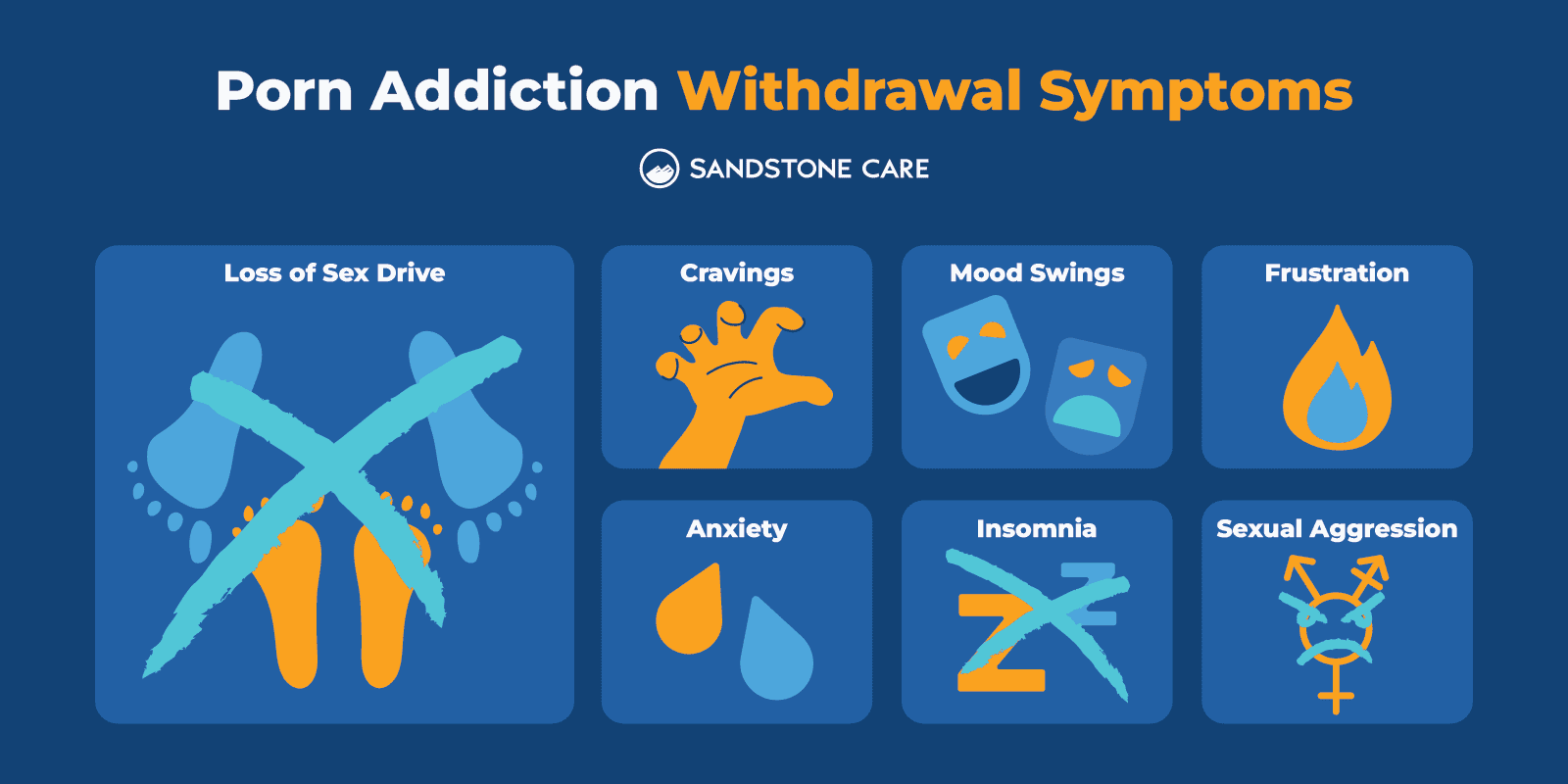
Porn Addiction Help, Treatment, and Therapy
How Can You Help Someone With a Porn Addiction?
If you think that a loved one may have a porn addiction, it can feel like a difficult or uncomfortable subject to talk about.
Sometimes, a person may not see that there is a problem or be in denial about it. Having a calm and open conversation about it may help.
However, it is also important to remember that a person will not get help if they don’t want it. Letting them know you are there for them when they are ready to talk or helping them connect with professional resources can go a long way.
If you are planning to have a conversation about porn addiction, it is important to plan what you want to say, stay calm, be patient, and listen to what they are saying. It is also important to set boundaries and be clear with what you say to try to avoid miscommunication.
It can also be helpful to remember that you are not there to fix them but can simply be there for them and work with them.
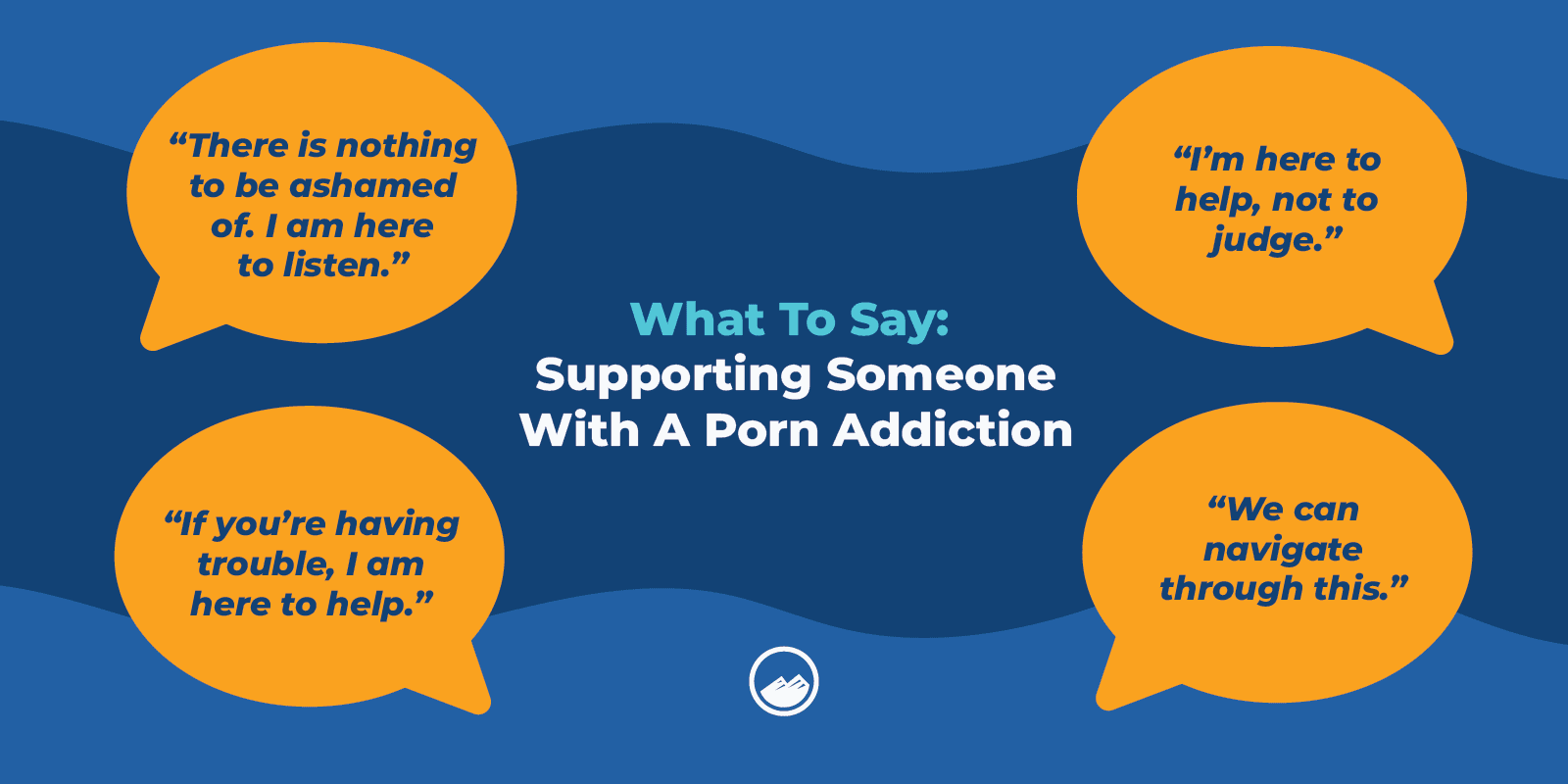
When Should You See a Doctor for a Porn Addiction?
You should consider seeing a doctor for porn addiction if you’ve tried to stop and have been unable to, or if your porn use is interfering with your daily life, relationships, or work.
If you feel overwhelmed, guilty, or ashamed, or notice that you’re relying on porn to cope with stress, anxiety, or other emotions, it might be time to seek help.
A doctor, therapist, or addiction specialist can help you understand the underlying causes of your addiction and provide the support and tools you need to break the cycle. Don’t wait until things get worse—reaching out for help early can make a big difference.
How Do You Treat Pornography Addiction?
Psychotherapy is the most common treatment for individuals with a porn addiction.
Cognitive behavioral therapy (CBT) is a common and effective form of psychotherapy that can help a person identify negative thoughts and behavior patterns, as well as identify triggers that can help a person change and restructure them.
If a person’s porn addiction is stemming from relationship problems, it may also be helpful to see a relationship counselor or therapist.
The American Association of Sexuality Educators, Counselors, and Therapists (AASECT) is a professional organization that is comprised of sexuality educators, sexuality counselors, and sex therapists.
Additionally, many people find it helpful to join support groups where they can meet other people who may share similar experiences and learn from each other.
Porn addiction can cause a person to isolate themselves, and joining a support group can help them build meaningful connections and a strong support network.
Is There Porn Addiction Counseling Near Me?
You can search “porn addiction counseling near me” or reach out to your healthcare provider to help you find resources to connect you to help.
The Substance Abuse And Mental Health Services Administration (SAMHSA) has a behavioral health treatment locator that serves as a confidential and anonymous resource for individuals looking for help with mental health and substance use disorders.


Let’s Take the Next Steps Together
A porn addiction is when a person cannot stop porn use, despite the negative consequences it has on their life and wellness. Sandstone Care is here to support teens and young adults with mental health and substance use disorders.

